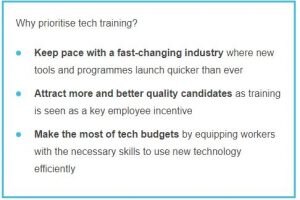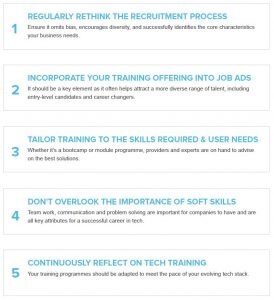Build fit-for-purpose tech training programmes
Delve into the training trends, challenges, and ambitions of the UK’s tech workforce and get actionable insights to help businesses train up the technology skill sets they need whether it is through hiring, upskilling or reskilling talent.

£1.48 million – this is by how much overall UK businesses increased their investment in tech tools, talent and training last year*.
This is what our latest research of 1,000 UK tech workers and 500 IT decision makers reveals, which aims to understand how tech investment and relevant training is developing as a result of increased tech demand.
However, despite positive investment, only a quarter of IT decision makers (27%) are satisfied with their employees’ abilities to use these new technologies properly. Similarly, just 9% of companies have trained staff to use all the technologies they invested in. As such, there is a clear disconnect between the amount of industry investment in tech and the extent of effective training initiatives.
We wanted to share our insights into how companies can develop successful training initiatives:
Key findings:
- Over two-thirds (67%) of IT decision makers say their company’s spend on tech training initiatives increased in 2020, with the average spend increasing by £189k.
- In 2020, only an average of 9% of companies trained all relevant staff in the technologies they invested in.
- Almost two thirds (65%) of tech workers view technology training as an important employee incentive.
- Just under 3 in 5 (59%) of IT decision makers are placing greater investment in training and resources to prevent or decrease the need for troubleshooting.
- Over 3 in 5 (62%) IT decision makers said technology training is high on their company’s agenda for 2021 and they will be reviewing their technology training strategy this year (63%)
Closing the tech skills gap
Businesses have much more to gain from technology training beyond realising the potential of their investments. For two-thirds of tech workers (65%), training is an important incentive and almost all (94%) value training throughout their careers. In the long-term, tech training can help close the UK’s skills gap, which is facing new challenges from Brexit and Covid-19.
Almost three in five organisations (57%) said Brexit will widen the tech skills gap, due to the impact on the flow of talent coming from the EU. Likewise, 58% say the pandemic has put greater pressure on hiring tech talent. Businesses are now scrambling to develop these skill sets from other avenues.
The challenges of delivering tech training
Our research finds that not only is tech training lacking, but that IT decision makers are facing various challenges when it comes to delivering effective programmes.
A quarter (25%) say that there’s hesitancy from both workers and their superiors to make time for training, whereas a third (33%) struggle to deliver sessions whilst working remotely. A similar number (31%) say they can’t keep employees engaged.
While three in five (63%) businesses say they will be reviewing their tech training strategy this year, these findings suggest they’ll fail to deliver if they can’t plan for remote delivery and find ways to create engaging virtual programmes.
Investing time and budget into training programmes
Our report finds that employers are taking a broader approach to supplementing their technology departments in 2021. Companies are planning to develop tech expertise through investing in upskilling (22%), reskilling (21%), entry-level roles (20%) and experienced roles (21%).
For HR teams looking to bridge the tech talent gap in their organisations, it’s essential to invest time and budget into developing bespoke training programmes to meet employees’ needs.

Tech workers say that one of the top training initiatives companies should offer when upskilling is mentoring (30%). Interestingly, when broken down, only 23% of those aged 16-24 say that mentoring should be offered as training to upskill tech employees, in comparison to 44% of over 55s who said the same.
Not only does investing in bespoke training help nurture much-needed tech candidates – it will attract them to roles too. Companies that provide training should communicate this during the recruitment process in order to attract and retain top-level talent.
Taking a long-term approach
While training plays a key role in most onboarding strategies, businesses need to take a long-term approach and continue to provide training on an ongoing basis.
Almost all tech workers say they value training throughout their careers and over two thirds (67%) say that training needs to be regularly refreshed. To retain talent, employers need to provide training opportunities at every stage of the career path.
Our research also finds that 66% of tech workers say that technologies and training can become out of date quickly in today’s modern world. Companies therefore, need to ensure that training materials are relevant for today’s workforce. This is particularly important at the moment, as companies are relying on technology more than ever for remote training as well as daily operations.
Catering to different learning preferences
Key to developing an effective training programme is acknowledging that people have different learning preferences. Our report finds that younger tech workers (aged 16-24) prefer creative training programmes such as digital bootcamps (26%) and gamified learning (25%).
These preferences further support the need for businesses to listen to their employees and offer programmes that are tailored to their needs.
One company that’s successfully delivering tech training is BAE Systems. As one of the leading technology and defence manufacturers in the UK, the company places great focus on its careers and training programmes. A significant proportion of its skills come from its early careers programmes. More than 1,250 apprentices and graduates will be hired in 2021 – a record for the company, despite the pandemic.
Apprentices and graduates are extremely important to BAE Systems. They are the future of our business – the ones who will be delivering nationally important technology programmes such as Tempest and Dreadnought. We invest significant time in support and training throughout their careers, which results in stronger retention and keeps our employees’ skills at the highest standards.
Ted Creighton, Head of Early Careers and Skills at BAE Systems
For businesses looking to hire and nurture tech talent via early careers programmes, Ted Creighton’s three top tips would be:
- Focus on the needs of your business and build a curriculum around this
- Build training programmes on three core pillars of Learning: Tools, Minds and Skills
- Continuously review and refresh these programmes to ensure they’re relevant and modernised
Upgrading your tech training
For organisations looking to build expert technology teams, Dominic Harvey’s top five tips for HR professionals are:
Given the essential role that tech training plays in ensuring the sector is set up for continued success, at CWJobs, we believe the industry needs to address this issue moving forward. For HR teams to bridge the tech skills gap in their organisations and ensure all staff have core digital competencies, employers need to invest time and budget into creating training programmes that will meet their employees’ needs.
*Overall average budget increase of £1.48 million consists of tech investment (£1,084,956 average increase), tech hires (£210,000) and tech training (£188,000) combined.


